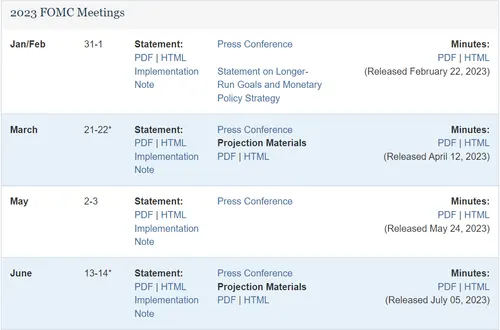Our partner, XM, lets you access a free demo account to apply your knowledge.
No hidden costs, no tricks.

The U.S. Federal Reserve is an important regulatory player on the global financial markets. While it is not directly concerned with stock market performance, it is the primary body that sets the monetary policy of the country, which greatly affects the performance of various asset classes.
The Federal Open Market Committee (FOMC) is a key component of the United States Federal Reserve System, playing a pivotal role in shaping the nation's monetary policy.
Comprising the central bank's Board of Governors and regional Federal Reserve Bank presidents, the FOMC convenes regularly to assess economic conditions and determine the appropriate stance for monetary policy.
The FOMC regularly meets up throughout the year to discuss the state of the global and local economies, macroeconomic factors affecting the country, and announce any planned interest rate changes, which are then included in the FOMC minutes and released to the public.
The FOMC's primary objective is to foster maximum sustainable employment, stable prices, and moderate long-term interest rates, which makes it an incredibly important decision-making body with direct implications on the global financial system.
If you are a beginner trader and would like to know more about how the FOMC works, this investfox guide is for you.
The FOMC is a multi-purpose component of the Federal Reserve System and is tasked with a few key functions, such as:
The FOMC holds regular meetings to assess economic conditions and set monetary policy.
During these meetings, members discuss data on inflation, employment, and GDP growth.
Decisions on interest rates and other policy tools are made, impacting financial markets globally.
After each meeting, detailed minutes are released, providing insights into the committee's discussions and the rationale behind its decisions.
These minutes are closely scrutinized by investors, economists, and policymakers for clues about future policy directions, offering transparency into the FOMC's decision-making process.
The Federal Reserve website regularly updates the schedule of FOMC meetings for analysts and investors to keep track of the Fed’s activity.

Interest rate changes can greatly affect the capital markets, such as stock, forex, and bond markets.
Bonds are the asset class that is most affected by interest rate changes. For instance, high interest rates set by the FOMC make bonds very attractive due to their stable and predictable nature.
Interest rates also greatly affect stock performance. When interest rates rise, borrowing becomes more expensive and investors choose to shy away from speculative equities, placing most of their capital in fixed-income securities, such as bonds, bills, and notes.
Therefore, when interest rates rise, stock market performance tends to stagnate or fall, and vice versa. Access to cheap capital is the breeding ground for speculative investments, which can lead to asset bubbles.
As for the forex market, higher interest rates can increase the strength and lower inflation of a particular currency, which affects its performance in the global currency exchange markets.
Our partner, XM, lets you access a free demo account to apply your knowledge.
No hidden costs, no tricks.
The FOMC (Federal Open Market Committee) formulates and implements U.S. monetary policy. It assesses economic conditions, sets interest rates, and employs various tools to achieve the dual mandate of maximum sustainable employment and stable prices, influencing the nation's economic and financial well-being.
FOMC minutes are crucial as they provide detailed insights into the Federal Reserve's decision-making process, offering clarity on economic assessments and policy considerations. Investors and analysts analyze these minutes for indications of future monetary policy actions and economic outlooks.
The Federal Open Market Committee (FOMC) typically meets eight times a year, approximately every six weeks. However, the schedule is subject to change based on economic conditions and emerging financial challenges.